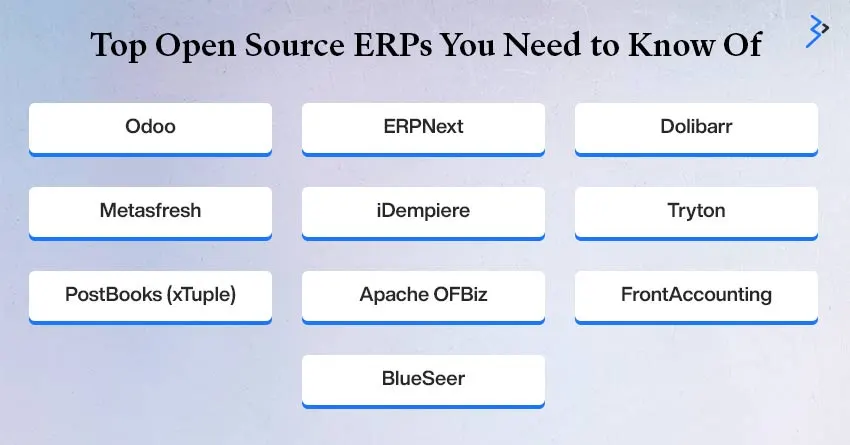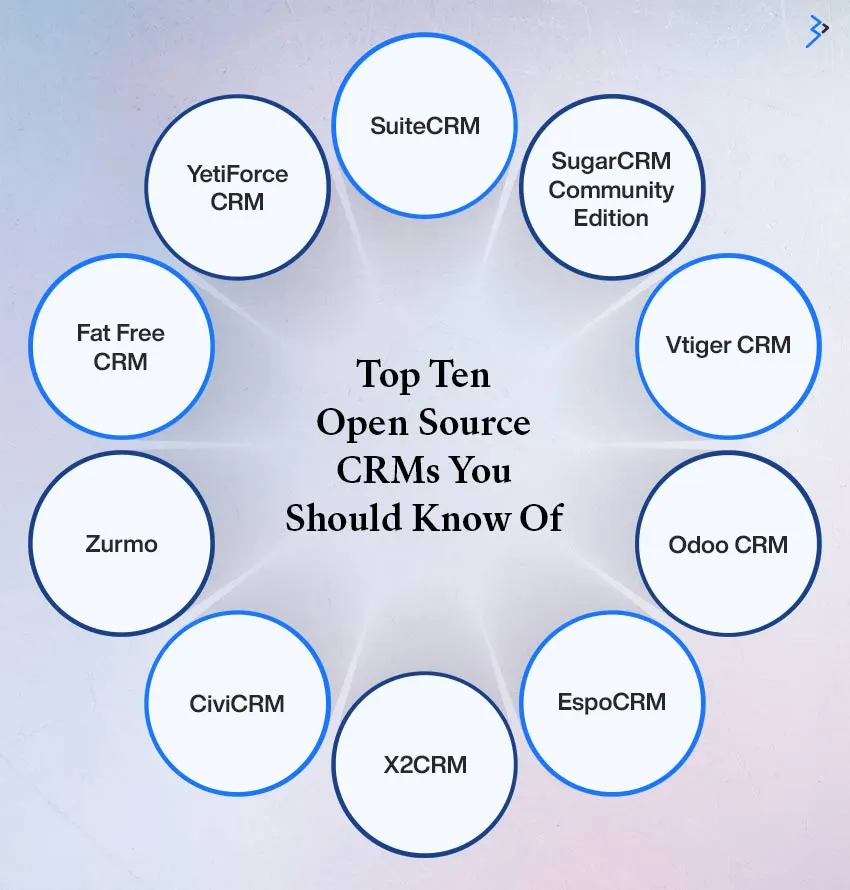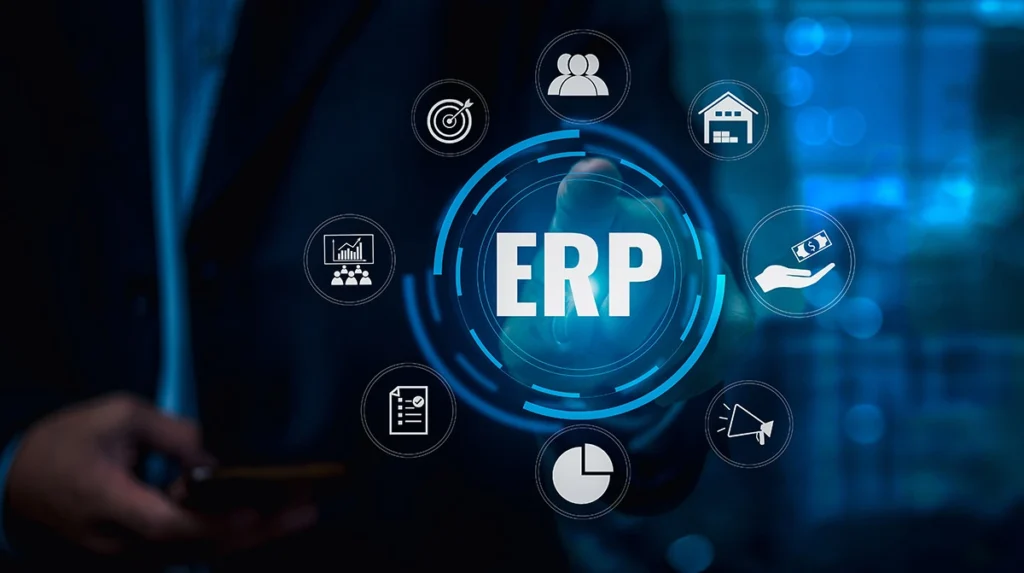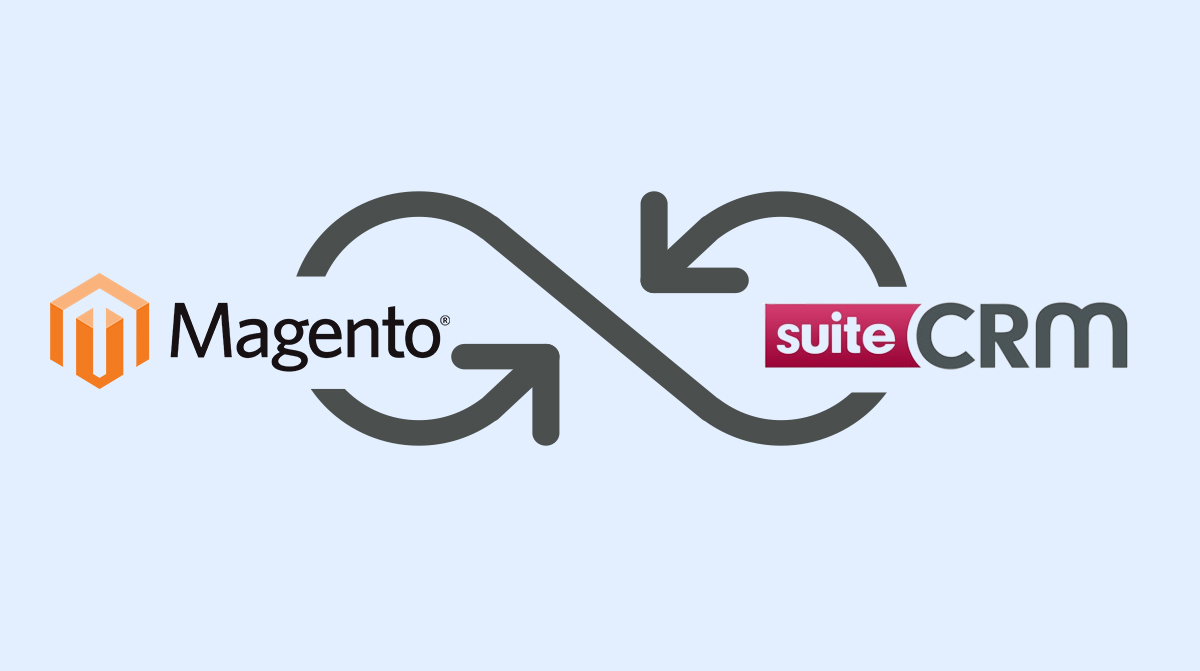Running a business isn’t easy!
It’s more than managing a handful of employees, pricing, product planning, accounting, and finance. As a business owner, you must combine various tools to create the perfect suite for your operations.
Sadly, this approach can confuse you and reduce your productivity. Not having a robust suite could result in losing nearly 20% of opportunities.
Interestingly, that’s where tools like Enterprise Resource Planning (ERP) and Customer Relationship Management (CRM) systems step in as the lifelines of any growing business.
Whether a small business or a large enterprise, these tools streamline different operations, improve customer relationships, and optimize productivity. However, this software can be expensive, which is where open-source solutions come into play. They are flexible, cost-effective, and highly customizable.
Therefore, in this blog, we aim to look in-depth at ERP and CRM in the following sections. Let’s get started.
Understanding Open Source ERP & CRM: What’s Different?
Enterprise Resource Planning (ERP) compiles a complete suite of applications to manage an organization’s different business processes. It is designed to increase efficiency and productivity.
On the contrary, open-source ERP software can be defined by greater control and freedom of choice than some proprietary software. The vendor usually doesn’t release the source code, which compels the users to rely on already available features or pay the vendor more money for any required custom features.
Similarly, an open-source CRM (Customer Relationship Management) system includes a sales funnel and lead nurturing functionality similar to commercial CRMs. However, the source code allows users to alter, integrate, and distribute. The top open-source business software allows firms to design cost-effective solutions tailored to their industry’s needs.
However, there is a catch! Although no licensing fee is involved, and users can access the source code free of cost, some of the renowned and established open-source ERP vendors offer paid subscription plans for additional services.
Therefore, this article will create the top 10 open-source CRM and ERP systems list you must consider as a business owner. The following sections will discuss this software’s features, benefits, and unique aspects.
Top Open Source ERPs You Need to Know Of

1. Odoo: All-in-One Business Suite
| Functionality | Overall Rating |
| Overall Rating | 4.5/5 |
| Core Features | 4.2/5 |
| Customer Support | 4.8/5 |
| Customization | 4.6/5 |
Oddo is arguably the most popular self-hosted ERP and CRM platform. Its development started in 2005, and its source code is written in Python. Odoo is licensed under GPL 3 and offers proprietary SaaS if you wish to pay directly for using the service with support and ease.
One of the defining features is its modular architecture, which offers over 30 core modules, such as CRM, accounting, inventory, human resources, and project management. Additionally, the app store provides thousands of community-developed modules, enabling businesses to tailor their setup to specific needs.
2. ERPNext: User-Friendly and Comprehensive
| Functionality | Overall Rating |
| Overall Rating | 4.4/5 |
| Core Features | 4.0/5 |
| Customer Support | 4.6/5 |
| Customization | 4.6/5 |
ERPNext is a modern, cloud-based ERP system designed to cater to businesses of all sizes. It was developed by Frappe Technologies in 2008. It helps manage various aspects of business operations like accounting, inventory, manufacturing, human resources, CRM, purchasing, and project management. It also aids industry-specific modules for various domains like healthcare, agriculture, healthcare, and even non-profit organizations. This makes ERPNext highly versatile.
Some specialized features of EPRNext include cloud-based support systems, on-premises, and hybrid deployments. These allow business owners to manage their operations according to their customer base, demands and aims. EPRNext also includes multi-language and multi-currency support to host clients from all over the world.
Read More-: Best Real Estate ERP and CRM Platforms To Use in 2025
3. Dolibarr: Simplicity Meets Functionality
| Functionality | Overall Rating |
| Overall Rating | 4.3/5 |
| Core Features | 4.4/5 |
| Customer Support | 4.6/5 |
| Customization | 4.2/5 |

Dolibarr is another ERP system example that has gained popularity after being released in 2003 for its simplicity, flexibility, and affordability. It provides the business with a modular system, allowing users to activate only the needed features. Core functionalities include CRM, sales management, inventory, and project management.
Other modules support eCommerce integration, point-of-sale, and event management, making it suitable for business requirements. This web-based software allows access from any device with an internet connection. It supports on-premises or cloud hosting. It is ideal for business owners with limited technical expatriates and supports multi-language and multi-currency environments.
4. Tryton: A Modular and Lightweight ERP
| Functionality | Overall Rating |
| Overall Rating | 4.2/5 |
| Core Features | 4.1/5 |
| Customer Support | 4.3/5 |
| Customization | 4.4/5 |
Tryton is flexible, open-source enterprise resource planning software designed and released in 2008 to streamline and manage various business processes. It is built on a modular architecture, allowing businesses to activate only the needed features, making it adaptable to diverse industries and operations. The core modules cover key business functionalities, including accounting, project management, and human resources.
This modular structure enables companies to customize the ERP setup for their businesses by adding all the necessary features without any hassle. Its system consists of 3 parts- Tryton Database, Tryton Server, and Tryton Client. The Tryton Database is a data storage system such as PostgreSQL. Tryton Server is the main application responsible for providing all the functionalities. Lastly, the Tryton Client is the web software enabling communication with the server.
5. Apache OFBiz
| Functionality | Overall Rating |
| Overall Rating | 4.0/5 |
| Core Features | 4.1/5 |
| Customer Support | 4.3/5 |
| Customization | 4.1/5 |
Apache OFBiz is built around a standard architecture, allowing users to efficiently configure the system to meet their needs and objectives. The system is geared at medium to big firms. It has a variety of functions to assist internal support development resources, making it simple for businesses to connect it with their current infrastructure and procedures.
This free ERP software has been Apache’s best-performing product for over a decade. The system has evolved significantly since its debut, providing customers with more stability and uptime. Apache OFBiz is released under the Apache 2.0 license and uses Java as its primary language. The system’s source code is available for download from the project’s repository.
Read More-: Building Seamless Integrations: Dynamics 365 Development for ERP and CRM
Top Open Source CRMs You Need to Know Of

1. SuiteCRM: The Open-Source CRM Alternative to Salesforce
| Functionality | Overall Rating |
| Overall Rating | 4.8/5 |
| Core Features | 4.5/5 |
| Customer Support | 4.3/5 |
| Customization | 4.2/5 |
SuiteCRM is a strong open-source customer relationship management solution. It allows firms to manage support activities, client contacts, sales, and marketing. Launched in 2013, SuiteCRM offers your organization a low-cost and configurable CRM system.
SuiteCRM offers various functions, including opportunity management, sales automation, lead, and email marketing, among other tools. It also includes modules for contract administration, calendar scheduling, and more. Its user-friendly dashboard gives a single view of critical indicators and enables customers to track their company’s success.
2. Flatogic: User-Friendly CRM for You
| Functionality | Overall Rating |
| Overall Rating | 4.3/5 |
| Core Features | 4.4/5 |
| Customer Support | 4.1/5 |
| Customization | 4.0/5 |
Flatlogic is a sophisticated, adaptable CRM system for small and medium-sized organizations. It provides a comprehensive set of tools for managing client relationships, sales funnels, and marketing initiatives. Flatlogic’s user-friendly interface allows customers to get up and running fast, and its configurable features enable firms to adjust the program to their requirements.
Furthermore, Flatlogic interfaces smoothly with other corporate software, maintaining a consistent department workflow. Its open-source nature gives you complete control over your data and flexibility in deployment.
3. EspoCRM: Go-to Software for Minimal Efforts
| Functionality | Overall Rating |
| Overall Rating | 4.1/5 |
| Core Features | 4.3/5 |
| Customer Support | 4.2/5 |
| Customization | 4.3/5 |
EspoCRM is a free, open-source CRM system for small and medium-sized organizations that is lightweight and simple. It focuses on offering key CRM operations without adding extra features, keeping it simple and accessible. EspoCRM provides solutions for managing sales, customer relations, and company operations in a simple and user-friendly interface.
The highly adaptable program allows customers to modify it to their requirements with minimum effort. Its open-source nature means enterprises have total ownership over their data and may tailor the program to their specific operations.
4. VTiger CRM: Comprehensive CRM for Everyday Use
| Functionality | Overall Rating |
| Overall Rating | 4.4/5 |
| Core Features | 4.2/5 |
| Customer Support | 4.0/5 |
| Customization | 4.1/5 |
Vtiger CRM is a free, open-source solution integrating sales, marketing, and support into one platform. It strives to give a single perspective on customer interactions and business operations, allowing firms to increase productivity and customer satisfaction.
Vtiger’s broad features include email marketing, customer service, and lead management tools, making it ideal for enterprises of all sizes. The software’s open-source nature allows for substantial modification, guaranteeing that it can fulfill the unique requirements of many businesses. Vtiger is meant to improve team communication, streamline operations, and accelerate corporate success.
Read More-: Advantages of Odoo ERP Implementation in Trading Business
5. CiviCRM: Best for Outreach Functionalities
| Functionality | Overall Rating |
| Overall Rating | 4.2/5 |
| Core Features | 4.0/5 |
| Customer Support | 4.1/5 |
| Customization | 4.2/5 |
CiviCRM is a free, open-source CRM solution for non-profit and civic-sector organizations. It has specific tools for tracking contacts, memberships, contributions, events, and campaigns, making it an excellent choice for non-profits trying to improve operational efficiency.
CiviCRM interacts smoothly with significant content management systems such as Drupal, WordPress, and Joomla, giving non-profits a powerful platform for managing all their relationships and outreach areas. Its open-source methodology ensures that businesses maintain data ownership and may tailor the program to their needs.
How to Choose the Right Solution for Your Business?
Choosing the best free, open-source CRM or ERP will improve your company’s productivity, customer happiness, and growth potential.
Here’s a comprehensive resource to help you make an educated selection around CRM and ERP software tools.
Assessing Your Business Needs
Before delving into the features and specs of various platforms, take a step back and assess your company’s requirements. Consider the questions below:
- What is your primary goal? Are you looking to improve sales procedures, provide better customer service, or streamline marketing efforts?
- Are you looking for affordable ERP and CRM, or are you willing to invest in the software?
- What is your business’s size and structure? The size of your workforce and the complexity of your business will affect your CRM or ERP selection.
Read More-: 12 Best ERP Software For Manufacturing Industry In 2025
Evaluating Feature Requirements
Once you understand your business needs well, you can compare the features provided by various systems. Here’s what you should look for:
- Core Features: Ensure the has critical capabilities like contact management, sales monitoring, and reporting.
- Automation Functionality: Look for capabilities to automate repetitive work, such as email follow-ups and lead assignments.
- Customization Options: The CRM should be adaptable enough to your specific company procedures.
- Integration Capabilities: Check if the CRM connects with your existing tools, such as marketing, email clients, and accounting software platforms.
- User Interface and Experience: A user-friendly interface is essential for your team’s rapid adoption and effective utilization.
Conclusion
So there you have it—some of the best open-source ERP and CRM systems for 2024. As mentioned, these systems can be a powerhouse for your operations when appropriately implemented. CRM and ERP software tools may significantly boost a company’s efficiency and production while lowering the cost of everyday business operations.
However, if you’re still confused about the options and looking to adopt these robust suites into your legacy systems, we suggest going with Odoo, the #1 CRM and ERP tool. You can easily consult an Odoo partner to integrate the software into your system and streamline the process with a premier Odoo development company. All the best!
Related Articles
-
Boosting Sales Performance With Mobile CRM Apps
In today’s fast-paced business landscape, customer relationship management (CRM) is crucial in driving sales performance and fostering lasting customer relationships. With the advent of mobile technology, the evolution of CRM
-
Magento Bridge – The Unbreakable Bond Between Magento & SuiteCRM Users
The growing needs of eCommerce businesses and the dynamic shifts in consumer expectations have contributed towards the rise of Enterprise Application Integration. These integrations are the foundation of a true
-
Customer 360 View: An Advanced Plugin that Transforms Your Customer Engagement Like Never Before
Unmatched customer experience is the result of a well-planned customer engagement strategy. Needless to say, the customer 360-degree view has become an indispensable feature when planning such strategies. But here’s




